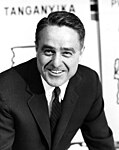The 1976 Iowa Democratic presidential caucuses were held on January 19, 1976, the first nominating contest in the Democratic presidential primaries for the 1976 presidential election. It had the little-known Governor of Georgia Jimmy Carter campaign heavily and end up capturing 27.7% of the vote, the highest of the five candidates. An outpouring of media coverage of Carter soon emerged.
| |||||||||||||||||||||||||||||||||||||||||||||||||||||
| |||||||||||||||||||||||||||||||||||||||||||||||||||||
Candidates
editResults
edit| 1976 Iowa Democratic presidential caucuses[1] | ||||
|---|---|---|---|---|
| Candidate | State Delegates | Popular vote | Percentage | Delegates[2][a] |
| Uncommitted | 1,070 | 14,508 | 37.16% | 18 |
| Jimmy Carter | 940 | 10,764 | 27.57% | 13 |
| Birch Bayh | 257 | 5,148 | 13.19% | 6 |
| Fred R. Harris | 173 | 3,861 | 9.89% | 5 |
| Mo Udall | 88 | 2,340 | 5.99% | 3 |
| Sargent Shriver | 32 | 1,287 | 3.30% | 2 |
| Henry M. Jackson | 0 | 429 | 1.10% | 0 |
| Other | 0 | 702 | 1.80% | 0 |
| 2,560 | 39,039 | 100.00% | 47 | |
Uncommitted won 14,508 votes (37%) and Carter 10,764 votes (27%). Birch Bayh, a Senator from Indiana got 5,148 (13%). Udall dropped to 5th place with only 6%, behind Fred R. Harris of Oklahoma, which led to Harris coining the term "winnowed in" to refer to his surprisingly-strong showing.[3][4][5][6]
References
edit- ^ "IA US President - D Caucuses Race - Jan 19, 1976". Our Campaigns. December 2, 2021. Retrieved February 23, 2022.
- ^ "CAUCUS RESULTS - Iowa Publications Online" (PDF). Retrieved August 28, 2022.
- ^ Jules Witcover, No Way to Pick A President: How Money and Hired Guns Have Debased American Elections, 2001, p.166
- ^ George C. Edwards, John Howard Kessel, Bert A. Rockman, Researching the presidency: vital questions, new approaches, 1993, p.60
- ^ "The Green Papers: Commentary".
- ^ "The Green Papers: Commentary".
Notes
edit- ^ The delegates given below are rough estimates and based on the strength shown at the caucuses





